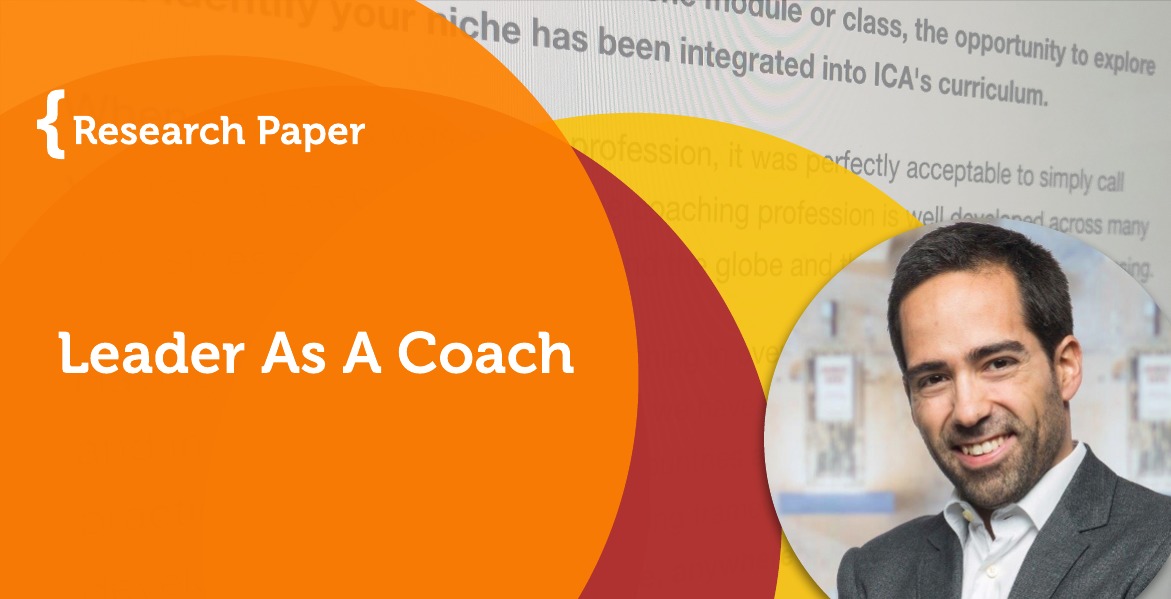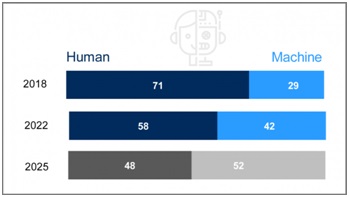 Research Paper By Eduardo Mendes
Research Paper By Eduardo Mendes
(Executive and Leadership Coach, PORTUGAL)
 The Context
The Context
Never before in history have Coaches been so needed (Poole, 2020).
The word VUCA has become a trendy managerial acronym. This is short for volatility, uncertainty, complexity, and ambiguity. VUCA conflates four distinct types of challenges that are contributing to the fact that never before in history, the world is so rapidly and unpredictably changing.
The truth of the matter is, it was always complex, but as you introduce more independent variables interacting with each other to produce certain outcomes, and as you increase the speed of their interactions than the number of outputs you get per unit of time is such that one can only assume that all events in the universe are the consequence of random preceding events. The whole cause and consequence syllogism would be greatly endangered by this assumption!
Thinking of cause and consequence, let’s diverge into a metaphor. In his brilliantly engendered essayThe Black Swan, Nassim Nicholas Taleb(2007) drawn an utterly interesting analysis of the mathematical physicist Michael Berry’s work about the movement of a billiard ball. Berry postulated that if you know a set of basic parameters concerning the ball at rest (the resistance of the table, the strength of the impact, etc) then it is rather easy to predict what would happen at the first hit. The second impact becomes more complicated, and it goes on and on until the fact that to correctly predict the fifty-sixth impact, every single elementary particle of the universe needs to be present in your assumptions (Taleb, 2007)!
It is therefore complex to theorize about how the current sociological, economic, political, and behavioral trends will impact the future of our world. However, in the next few decades, other revolutions as important as the advent of the internet will likely come (Harari, 2017). With these revolutions, we will likely see technology gaining importance over politics and policymakers, which will introduce further complexity in the system. As a consequence, artificial intelligence and biotechnology may probably reconfigure our societies and economy.
For the sake of the argument, suppose that a policymaker proposes to cut funding for a certain research field, out of concern for the risks or long-term consequences of some hypothetical technology that might eventually grow from its soil. S/he can then expect opposition from the research community. Scientists and their public advocates often say that it is futile to try to control the evolution of technology by blocking research (Bostrom, 2014). If we assume this to be true, then one can also assume that all-important basic capabilities that could be obtained through some possible technology will be, in fact, obtained.
Put it all together and it is safe to say that we are at the beginning of a so-called fourth industrial revolution (Rifkin, 2015)that is fundamentally changing the way we live, work and relate to one another, where big data, analytics, and digital technology will change the future of work.
If we take a look upon the conclusions drilled down by the World Economic Forum on the subject of the future of work, it is logical to anticipate that in the next five years more than half of all workplace tasks will be performed by machines. Many jobs, as we know them, will cease to exist. Paper after paper, we can see the warns of the impact of automation on working people.
Also, we’ve long considered machines an existential threat to our livelihoods (consider, for instance, the days when Luddites smashed looms in pre-industrial Britain), and yet economies – especially in the developed world – have survived and technological progress was achieved. Therefore, it is safe to say that the only thing we can expect – at least with the information we have today – is for this trend of replacing manpower with technology to continue to accelerate, as the following image illustrates.
 Image: World Economic Forum Future of Jobs Report 2018
Image: World Economic Forum Future of Jobs Report 2018
If the research is right, those who prefer to focus on opportunities rather than threats can only assume that a myriad of new jobs is about to emerge. In fact, more than those about to be lost to disruption. So, the question is: how worried should we really be? And how much can we say we know about the coming age of technological unemployment?
One thing’s for sure: we’re going to need new skills. Study after study shows that while technology will alter many roles directly, it’s also set to have indirect effects. As demand for mathematics, computing, and data analysis grow, so too will the need for human attributes like creativity, critical thinking, persuasion, and negotiation (World Economic Forum, 2020).
In its Future of Jobs report from 2018, the World Economic Forum outlines that the current shifts in the workforce will displace some workers while at the same time create new opportunities for others. It will be likely to assist in the continued fall in demand for manual skills and physical abilities. On the other hand, skills continuing to grow by2022 include analytical thinking and innovation, active learning and learning strategies, and a huge array of ‘human’ skills such as creativity, originality and initiative, critical thinking, persuasion, and negotiation, resilience and flexibility.
In conclusion, the world is now a fast-paced ever-changing ecosystem, but trends seem to indicate that human skills, particularly the ones related to our right side of the brain (Pink, 2010)will gain importance. Concepts such as emotional intelligence, leadership, social influence as well as service orientation will probably experience an outsized increase in demand relative to their current prominence.
This opens a myriad of opportunities for coaching practitioners and injects the need for companies to pursue a range of organizational strategies to stay competitive in the face of rapidly changing workforce skills requirements. To do this, the skills of executive leadership, the human resources function, and companies themselves will also need to evolve to successfully lead the transformation.
This paper focuses on the importance of a coaching attitude and skills outside of the coaching practice, into the workplace environment (perhaps even society in general!).
Never before in history have Coaches been so needed. Never before in history have a coaching culture been so needed. Never before in history have leaders who are also coaches been so needed!
If I can use the first person, as an HR executive in the corporate environment, this is a topic that fascinates me. And there was never a time before as interesting as this one to be living in!
Why is it important for leaders to develop their coaching skills?
Building Talent has become an essential leadership competency. Therefore, it is safe to say that every company could benefit from building a coaching culture.
If only it could be that easy… but the delusion comes from assuming that all leaders know how to coach. Which is far from being true.
Coaching is much more than giving feedback, teaching how to perform new tasks, or delivering performance reviews (which quite often are done arguably!). Plus, in the business environment, it is quite common for leaders to mix up different concepts such as training, mentoring, and coaching, without really knowing the differences between them. But we know, for a fact, that these are quite different as outlined next:
In the world of tomorrow, leaders will be as successful as they develop themselves as coaches. This is what will set them apart in a complex environment where a lot of data analysis, decision making, administrative and manual work will be performed by machines. To do that, leaders must focus on building five components in their behavioral repertoire:
- Short term and long-term performing development coaching: helping their employees become more effective in their current jobs and, at the same time, preparing them for the future. This involves getting to know their strengths and raising awareness about those strengths, helping them clarifying and defining their career goals and ambitions, and consequently supporting them in building those skills and capabilities deemed necessary to achieve the aforementioned goals.
- Understanding that Coaching is an attitude, and not an event: this is a continuous process of curiosity, listening, and developing trust, showing unconditional positive regard towards the coachee.
- Coaching can be formal and informal in the context of leadership: as the lead coach becomes more comfortable with the process, they can start to embed a coaching attitude in everything they do, in a sustained manner.
- Coaching is not about providing answers or advice: the leader coach needs to master the coaching competencies (ICA, 2020b). Leaders who coach listen to their employees and ask powerful questions, helping the coachees to find the answers on their own. Leaders who are also coaches have meaningful conversations, rather than issuing demands. They use their curiosity to ignite curiosity in the coachee, encouraging them to become invested in the outcome.
- Understanding that, as a leader, coaching might not be the right solution to every situation, as sometimes leaders must give direction, make decisions, and give orders to get to results. The leader needs to use his/her discernment to understand when coaching can or cannot be the right approach.
What’s in it for the Company, the Coach, and the Coachee
There are several benefits in building coaching skills as a leader and, ultimately, if done consistently throughout an entire organization, to build a coaching culture.
The leader coach will build relationships with his/her team at a deeper level, positioning him/herself as a collaborator instead of directing. By adopting an empowering attitude and by giving the coachee space to decide on the outcomes and paths, the leader coach will enable coachees to reinforce their sense of accountability.
It can be a fulfilling part of their job, not only because they tap into a different set of skills but also, as a consequence, they will see their team members progress. If the virtuous circle completes itself, then it is likely that results will appear faster and in a more sustained and consistent manner, helping to propel the leader’s career conversely.
As for the Coachees, they feel that their talent is being recognized and their potential is being respected, which is a great motivator. Therefore, it is likely that they will feel more engaged while working harder and faster to produce the desired and pre-agreed outcomes (which then again will bring benefits for the leader coach given the fact that s/he is accountable for the team’s output).
As for the organization, and if the above is proven correct, it is likely that benefit from higher levels of engagement, greater team morale, increased performance and productivity, higher retention rates (and therefore reducing all the direct and indirect costs of recruiting and talent loss), then, consequently, companies will have a positive impact in the bottom line of their P&Ls.
Building a Coaching Culture
A companies’ culture, as well as its mission, is perhaps the most important aspect of a business. It defines the set of behaviors that will ultimately lead to success or failure.
So, what is corporate culture? The simplest and perhaps most quoted definition was introduced quite a while ago by McKinsey & Company managing director, Marvin Bower (1966): “it is the way we do things around here.”
It starts with what people in a given corporate environment believe, which then will impact their behaviors and, lastly, this will drive the experience they deliver to themselves and others. It goes without saying that leaders impact greatly a companies’ culture as they set and enforce policies. Also, to the eye of the beholder, they are the embodiment of the companies’ value system and, therefore, when they behave, it is often perceived by their team members as the way the company behaves. So whatever leaders do, it will impact the behaviors of others and their attitude towards the company itself.
By their position, leaders have the ability and chance to make the desired corporate culture become reality. This is true for formal leaders but also for informal leaders.
Therefore, by building coaching skills as leaders, it is likely that the whole company will start embedding a coaching attitude in the way they do things. As a consequence, the new set of behaviors now being showcased by leaders will be noticed by everyone, thus propelling the whole corporate culture a step further, ultimately contributing to building a coaching culture. Also, there will be a virtuous circle where microstructures will also impact macro structures, as each person’s personal and professional growth will benefit the entire organization.
The ultimate aspiration would be for everyone in a company to be concerned for every other employees’ personal and professional growth, where each person assumes the best in others. This would be the right usage of what we call positive unconditional regard. This is what underlies a coaching culture.
The empathic company
In the digital age, with the advent of technology and the replacement of humans by robots as we saw in the first chapter, the ones who will be victorious are the ones who will be able to stay human, fostering those characteristics, skills, and behaviors unique to the human being, that formed the social glue that made of us the biggest community of collaborative individuals as a species since the cognitive revolution, 70.000 years ago (Harari, 2014).
An emphatic company is the one that embraces the enormous potential of information technology with a clear strategic commitment to stay human (Brown, 2016). These companies understand that we are in an era where it is dangerously easy to become technologically dependent on the detriment of building meaningful relationships with customers and colleagues. They know that genuine human interactions remain the glue of successful engagement and interaction.
In this brave new world currently unfolding before our eyes, some companies will neglect the importance of meaningful human interaction. We believe they will perish. At the same time, we stubbornly believe those companies that will win the game are the ones who keep themselves committed to leverage on their human side. Those companies will be more empathic, yes. But they will also score in all other right-brain capabilities (Pink, 2010). They will be more creative, more connected, more inspiring, more engaging, more attractive to work for. Ultimately, they will be more productive and more profitable than their competitors who failed to mind the gap.
We believe that a coaching attitude is key to this conundrum. We believe that the future belongs to those companies whose leaders are coaches! Those companies who succeed to craft and implement a coaching culture, that see everyone as a unique amalgamation of skills, perspectives, experience, background, and knowledge available to be put at the greater service of the organization. Next to this, these winning companies will have a particular culture where they will nurture the transparency around this underlying positive and unbiased attitude. This is about anchoring leader’s perspectives on a core coaching skill: acknowledgment. Acknowledgment is seen as the capacity to recognize something positive about a person and to let them know about it. By something positive, it can be a skill, a competency, a strength, an attitude, a value, or an act of goodwill. To acknowledge is to see someone in their purest form – to see them for the unique being they really are (ICA, 2020).
Acting as a coach will be, in our humble opinion, a differentiating attitude in the 21st century. And it might be the case that coaching skills will be the most sought-after skills in the next few years, as society strives to remain human in an ever-growing digital ecosystem.
References:
Bostrom, Nick (2014). Superintelligence: Paths, Dangers, Strategies. Oxford University Press
Bowers, Marvin (1966). The Will to Manage Corporate Success Through Programmed Management. New York: McGraw-Hill Company.
Brown, Mark (2016). The Empathic Enterprise: winning by staying human in the digital age. Vero Beach, Florida: Merchant Trask Press.
Câmara, Pedro B.; Guerra, Paulo Balreiraand Rodrigues, Joaquim Vicente(2006).Humanator(6th Ed).Lisboa, Publicações Dom Quixote.
Harari, YuvalNoah (2017). Homo Deus. Lisboa, Elsinore 20|20 Editora
Harari, YuvalNoah (2017). Sapiens. London, Penguin Random House UK.
ICA, (2020). Module: What is Coaching.
ICA, (2020). Module: Coaching Competencies.
ICA, (2020). Module: Acknowledgment.
Pink, Daniel (2010). A Nova Inteligência (5th Ed). Lisboa, Academia do Livro
Poole, Lorna (2020). Meet the Team: your advice for someone new to coaching? Retrieved from ICA@coachcampus Instagram
Rifkin, Jeremy (2015). The Zero Marginal Cost Society. New York, St. Martin’s Press LLC.
World Economic Forum, (2020). Davos 2020: Future of Work.